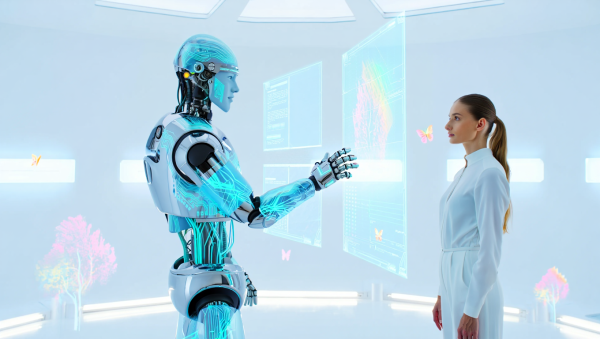
When AI Thinks for You, Your Brain Pays the Interest
July 2, 2025
Let’s be blunt. AI can either sharpen your edge or dull it to a butter knife. And most people? They’re getting duller by the week.
This isn’t because AI is evil, sentient, or planning to enslave humanity. It’s because people use it passively. They let the machine think for them, fill in the blanks, complete their sentences—sometimes literally. And when you outsource that kind of heavy lifting, your brain eventually forgets how to lift at all.
MIT recently ran an experiment that says it all. They had participants write essays over four months using different methods: some with AI, some with traditional search engines, and some with nothing but their grey matter. The results weren’t just telling—they were a warning flare. Those who leaned on AI showed lower brain activity, worse memory retention, and felt more detached from what they were writing. And when those same people had to switch gears and write without the machine? Their output tanked.
It’s like mental muscle atrophy. Use it or lose it.
The Accumulation of Cognitive Debt
Researchers referred to the effect as “cognitive debt.” It’s a good term—quietly devastating. You don’t feel the weight building up at first. AI handles tasks, provides answers, and lets you move quickly. You start to think, “This is efficient. This is smart.” But beneath that surface smoothness, something’s eroding. Your intuition dulls. Your recall fades. Your critical eye relaxes. You’re becoming a spectator to your thoughts.
The problem is subtle. It’s not that AI provides incorrect information (though it sometimes does). The deeper issue is that it fills in the steps your brain would normally take. You stop wrestling with ideas. You stop formulating your pathways. And if you do that long enough, you forget how even to begin. It’s like muscle memory in reverse—except instead of building, it dissolves.
This isn’t a sci-fi problem. It’s here, right now, quietly degrading the cognitive baseline of anyone too eager to let the machine take over.
Enhancing, Not Replacing: The Real Edge
Now here’s the twist that gets ignored in most headlines: people who started brain-first, then brought in AI to refine their output? They did better. Way better.
Why? Because the core was still theirs. They wrestled with the ideas, laid down the skeleton, engaged deeply first—then used AI to sharpen, fill in gaps, clean it up. They didn’t outsource their thinking. They enhanced it.
That’s the real edge—AI as a force multiplier, not a replacement. When used in this way, AI doesn’t weaken cognition; it enhances it. It’s the same reason a calculator doesn’t make you worse at math—unless you start using it before you understand the math. Then it becomes a crutch, not a tool.
So the takeaway here is simple: use AI after you’ve done the thinking. Don’t let it become your first move. And don’t let it become your only move.
The Rise of Synthetic Dementia
Let’s step back.
What happens when an entire generation starts to build cognitive debt from an early age? What does that look like at scale?
You get something that resembles early-onset dementia—but engineered. Not due to disease, but disuse. A mental fading, not from trauma or age, but from giving away the wheel. You stop navigating. You stop driving. And eventually, you forget how the road even works.
Let’s call it what it is: synthetic dementia.
That’s the trajectory we’re on. Not because AI is some malevolent force, but because people aren’t setting boundaries. There’s no intentionality. It’s just: “This makes life easier, so why not?” But what gets easier isn’t always what’s better. If you never exercise, sure, your joints stop hurting. But then they freeze up.
Same thing here. The less you engage with hard problems, the harder they get. Then comes the spiral: you stop trusting your mind. You stop having one.
The Mental Diet Analogy
Think of your mind like a metabolic system. AI is like a processed food—highly efficient, prepackaged, easy to digest. But eat only that, and your body breaks down. It’s the same cognitively. You need to chew through ideas. Wrestle with raw material. Build conceptual muscle.
And yes, it takes more time. It’s harder. It hurts sometimes. But that’s how strength is built—through friction.
This isn’t an anti-tech rant. Quite the opposite. This is a call to use the tech properly. Intentionally. Like a surgeon uses a scalpel. Not like a toddler with a chainsaw.
If you want to stay sharp, you have to earn your own insights before letting AI shape them. Otherwise, you’re feeding a machine while starving yourself.
Training vs. Dependency
There’s also the issue of emotional dependency. People don’t just use AI for work now—they use it for decisions. “Should I break up with my partner?” “What career should I pursue?” “Am I thinking correctly?” It’s subtle, but when you keep turning to a machine for internal answers, you start abandoning your own compass.
And sure, the answers might seem solid. AI is trained on data from millions of people. But it’s not trained on you. It doesn’t know your context. It doesn’t know your values. And it certainly doesn’t care.
So instead of growing into your own identity, you’re just being nudged into statistically average behavior—designed to avoid controversy, risk, or outlier thinking. That’s not growth. That’s flattening.
Vector Thinking and the Future of Attention
Let’s bring this back to vector thinking for a second. Every action points somewhere. Using AI passively? That points toward mental passivity. Using it critically, after deep engagement? That points to evolution.
The vectors matter.
And right now, the global vector is clear. Mass adoption. Mass ease. Mass mental outsourcing. If you’re not intentional, you will be swept along by it. You won’t even notice the decline until it’s far too late. Your mental attention span won’t just shorten—it’ll fracture. And the tragedy is you won’t even care because caring takes focus. And focus takes effort.
AI is not your enemy. But apathy is.
Final Thought: The Choice Is Still Yours
None of this is inevitable.
You can use AI like caffeine: a small boost, a sharp edge, and smarter output. But just like too much caffeine, overreliance leads to burnout. Diminishing returns. Eventually dysfunction.
Treat your mind like a valuable tool. Sharpen it first. Then bring the machine in to help with the finish, not to build the house for you.
Because in the end, if you lose your ability to think for yourself, it won’t be because AI stole it.
It’ll be because you gave it away.










